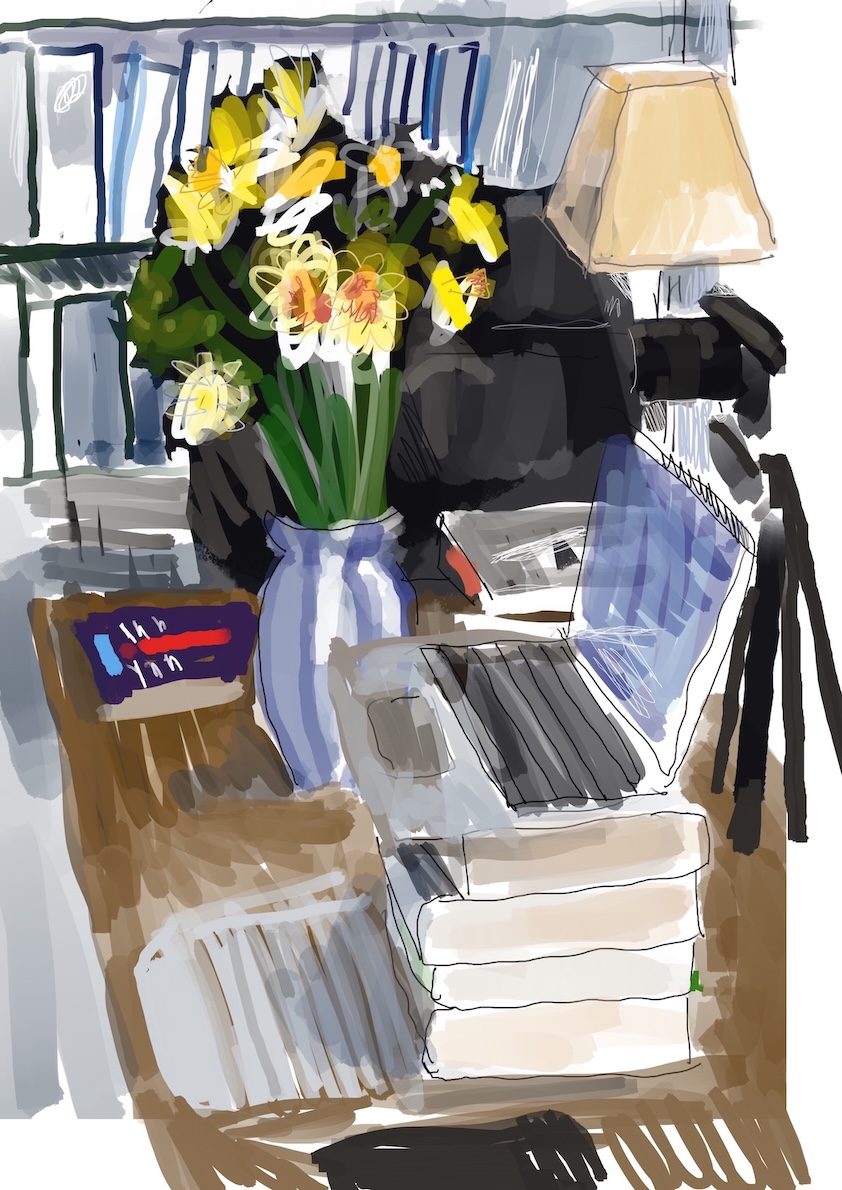Disadvantages of Typewriters | JPF Daily
|
Hello Reader I had a very positive response to yesterday’s email about the advantages of typewriters. Thank you. Here’s a less positive account. I invite you, as you read, to consider how much has really changed with the advent of computers.
The Erika typewriter company was established in the early 1900s by Carl Laufer and Ludwig Kracker: Erika was the name of Kracker’s wife. By the 1930s, Kracker had stepped down. Under Laufer, the company became one of Germany’s largest typewriter manufacturers. Its factories were turned over to making military equipment during WW2, but afterwards reverted to typewriters. And when Germany was split in half Erika, in the communist East, was nationalised. It supplied machines for use across the Soviet bloc, including many machines with Cyrillic type, like this one I drew after seeing the original in a workshop in East London.
The most common Cyrillic keyboard layout is known as JCUKEN or ЙЦУКЕН, based on the first letters of the top left letter row. This layout was developed in the late 19th century and has been the standard for Russian typewriters and computer keyboards. The JCUKEN layout follows a similar principle to the QWERTY layout, with the most frequently used letters placed in the middle row for easier access. *** Every typewriter has a slightly different “fingerprint”, and the East German security service, known as the Stasi, built up a library of those fingerprints in order to identify the source of unapproved materials. It’s quite likely that the nationalised Erika company collaborated with the Stasi in building up that library. In 1984, a physicist named Lutz Eigendorf defected to West Germany. He wrote a series of reports critical of the East German government, which were smuggled back into East Germany and distributed as samizdat (self-published, underground literature). The Stasi launched an investigation to identify the source of these subversive documents. They analyzed the typewritten reports and, using their library of typewriter fingerprints, determined that they had been typed on a specific Erika typewriter. Through further investigation, the Stasi identified the owner of the typewriter as a woman named Gisela Meyer, an acquaintance of Eigendorf. She was arrested, charged with “subversive activities” and “treasonous espionage” and sentenced to 4 years and 3 months in prison. *** Naturally, subversive typists tried to get around the problem of typewriter fingerprints. One way they did that was by using more than one machine to type any given document – creating a h yb rid fingerprint that was not traceable. But owning two machines was itself likely to attract suspicion. And if you collaborated with someone else, how could you be sure they were not Stasi informers? *** Erika was privatised soon after the reunification of Germany, in the early 1990s. The company struggled to compete in a market economy - with strong competition from computers - and soon closed down. *** Thanks for reading. Your attention is precious. JPF |
John-Paul Flintoff
📖 7 Books in 16 languages 📚 including: How To Change The World A Modest Book About How To Make An Adequate Speech.
Today’s date: 24 April 2025 Hello Reader Someone recommended a book in January, and I read it, and for three months I’ve been following its advice. I’m delighted I did. The book is called The 12-Week Year. The basic premise is that you can do as much in three months as you might otherwise achieve in a year, through a variety of small changes to your routines. Sounds a bit glib when I put it like that, but I found it extremely helpful. I tried explaining it to someone in real life the other...
Did you read yesterday’s email As well as drawing her - in her office in Wiltshire on Sunday - I took photos to use as reference as I continue to work on her portrait. “Her”? The former very senior editor at The Times, author and presenter of various flagship BBC radio programmes. The woman I mentioned in yesterday’s email. I hope you got that email. My intention is to send THIS email, which you’re reading now, only to people who received yesterday’s, and actively opted in to receive more in...
On Sunday I drove from London to Wiltshire. Just after Stonehenge I turned off the A303 and continued for a short distance until I came into a village. (Hello Reader. This is my newsletter.) There was scaffolding on the front of the first house and a cattle grid at the gates. I drove across, then along the driveway. I had come to start work on a new portrait. (I call this series Portraits of Interesting People in their Offices, or Poipitos.) The Interesting Person in question is a woman,...



